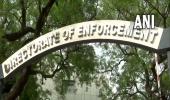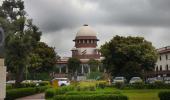'In no way can an advocate be considered responsible for his or her client's actions.'

Not taking kindly to the Enforcement Directorate's summons -- later withdrawn -- to two senior advocates Pratap Venugopal and Arvind Datar, legal experts have said though the agency can send such notices, this should be done only in the rarest of the rare cases.
"Normally and ideally unless the ED has concrete clear and irrefutable evidence as to the complicity of the lawyer in the matter of circumvention of any criminal law, a lawyer is a professional and the rules of confidentiality govern the relations with the clients and therefore the lawyer should not ideally be subject to any kind of investigation," senior advocate Sanjoy Ghose told Business Standard.
"It is the independence of the judiciary which is at stake because if agencies proceed against lawyers, then the lawyers will not be defending their clients," Ghose said.
The Supreme Court Advocates-on-Record Association (SCAORA) wrote to the Chief Justice of India, deploring the ED's action and seeking suo motu cognisance of the issuance of the summons to Venugopal.
It said the ED's action had ramifications for 'independence of the legal profession' and the 'foundational principle of lawyer-client privilege'.
Earlier this month, the ED had first sent notice to Datar, asking him to appear before the agency in connection with legal advice he had given Care Health Insurance on employee stock options (ESOPs) issued to former Religare Enterprises chairperson Rashmi Saluja.
After protests from lawyers and representations before the Supreme Court, the notice was withdrawn.
On June 18, the agency issued a second summons, this time to Venugopal in connection with the same issue.
In its notice, the ED asked Venugopal to furnish records pertaining to communication between him and Care Health Insurance as well as Religare Enterprises.
He was also asked to furnish these details on the legal opinion given for the grant of ESOPs to Saluja after the rejection of the grant by the insurance regulator.
The summons also required Venugopal to tender details of payment made by Care Health, Religare Enterprises, and other associate entities against the legal service sought by the companies.
He was asked to appear on June 27 before the assistant director of the ED in Mumbai.
"Legal opinion falls under the protection of attorney-client privilege. However, the issue becomes legally complex when legal opinion is allegedly used to facilitate an illegal transaction, such as money laundering or/and when the notice does not directly seek privileged communication, but circumstantial information such as payments received or internal communications," said Alay Razvi, managing partner of law firm Accord Juris.
Though lawyers can be summoned under procedural laws like the Prevention of Money Laundering Act (PMLA), 2002, it is contentious and opposed by the legal fraternity, Razvi said.
Himanshu Vidhani, partner at law firm Chandhiok & Mahajan, said the ED issuing summons to Datar and Venugopal appeared to be unprecedented.
Section 132 of the Bharatiya Sakshya Adhiniyam, 2023 (previously Section 126 of the Indian Evidence Act), provides protection of the attorney-client privilege.
The Madras high court had in 2002 deprecated the issuance of a summons to an advocate.
"Allowing investigative agencies to question advocates on advice given to clients would destabilise the foundation and independence of the legal profession, particularly in connection with criminal and white collar defence," said Divyam Agarwal, partner at law firm JSA Advocates & Solicitors.
Chinmay Bhosale, advocate at the Bombay high court, said: "In no way can an advocate be considered responsible for his or her client's actions."
An ED statement said: 'ED has issued a Circular for the guidance of the field formations that no summons shall be issued to any Advocate in violation of Section 132 of the Bhartiya Sakshya Adhiniyam, 2023. Further if any summons needs to be issued under the exceptions carved out in proviso to section 132 of the BSA, 2023, the same shall be issued only with the prior approval of the Director, ED.'
Feature Presentation: Aslam Hunani/Rediff











